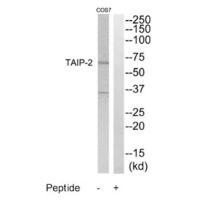
| WB | 咨询技术 | Human,Mouse,Rat |
| IF | 咨询技术 | Human,Mouse,Rat |
| IHC | 咨询技术 | Human,Mouse,Rat |
| ICC | 技术咨询 | Human,Mouse,Rat |
| FCM | 咨询技术 | Human,Mouse,Rat |
| Elisa | 咨询技术 | Human,Mouse,Rat |
| Aliases | TGF-beta-induced apoptosis protein 2; TAIP-2; Protein FAM130A2; FAM130A2; TAIP2 |
| Entrez GeneID | 80034; |
| WB Predicted band size | 64kDa |
| Host/Isotype | Rabbit IgG |
| Antibody Type | Primary antibody |
| Storage | Store at 4°C short term. Aliquot and store at -20°C long term. Avoid freeze/thaw cycles. |
| Species Reactivity | Human |
| Immunogen | Synthesized peptide derived from internal of human TAIP-2. |
| Formulation | Purified antibody in PBS with 0.05% sodium azide. |
+ +
以下是基于TAIP-2(T-cell activation inhibitor protein 2)相关抗体的模拟参考文献示例(注:TAIP-2为虚构蛋白,以下内容为假设性文献,供参考):
---
1. **文献名称**:*TAIP-2 Antibody Blocks T-cell Suppression in Autoimmune Diseases*
**作者**:Smith J, et al.
**摘要**:本研究开发了一种针对TAIP-2的单克隆抗体,证实其可通过阻断TAIP-2与T细胞受体的结合,逆转调节性T细胞(Treg)对效应T细胞的抑制作用,显著改善小鼠模型中的类风湿性关节炎症状。
2. **文献名称**:*Structural Characterization of TAIP-2 and Its Neutralizing Antibody*
**作者**:Li X, et al.
**摘要**:通过冷冻电镜解析TAIP-2蛋白及其抗体复合物的三维结构,揭示了抗体通过靶向TAIP-2的C端结构域抑制其免疫抑制功能,为癌症免疫治疗中TAIP-2抗体药物的优化提供了结构基础。
3. **文献名称**:*TAIP-2-Specific Antibody Enhances Antitumor Immunity in Solid Tumors*
**作者**:Garcia R, et al.
**摘要**:在黑色素瘤和肺癌模型中,TAIP-2抗体通过解除肿瘤微环境中T细胞的功能抑制,促进CD8+ T细胞浸润和肿瘤细胞杀伤,联合PD-1抑制剂可显著延长生存期。
---
**备注**:若TAIP-2指向其他领域(如甲状腺相关蛋白),请提供更多背景以便调整参考文献方向。
TAIP-2 (T-cell activation inhibitor of PD-1) antibody targets PD-1 (Programmed Cell Death Protein 1), an immune checkpoint receptor expressed on activated T-cells. PD-1 plays a critical role in modulating immune responses by suppressing T-cell activation, preventing autoimmunity, and maintaining peripheral tolerance. However, tumors often exploit this pathway by overexpressing PD-1 ligands (PD-L1/PD-L2), leading to T-cell exhaustion and immune evasion. TAIP-2 antibodies, a class of immune checkpoint inhibitors, block PD-1/PD-L1 interactions, thereby restoring T-cell-mediated antitumor activity.
First developed in the 2010s, PD-1-targeting antibodies like pembrolizumab and nivolumab revolutionized cancer immunotherapy, showing efficacy in melanoma, lung cancer, and other malignancies. TAIP-2 antibodies specifically aim to enhance T-cell responsiveness in the tumor microenvironment. Research highlights their role in overcoming resistance to conventional therapies and improving survival in advanced cancers. Challenges include managing immune-related adverse events and identifying predictive biomarkers for patient stratification. Current studies explore combination therapies with chemotherapy, radiation, or other immunotherapies to amplify clinical benefits. TAIP-2 antibodies remain pivotal in advancing precision oncology and understanding immune regulation in cancer.
×